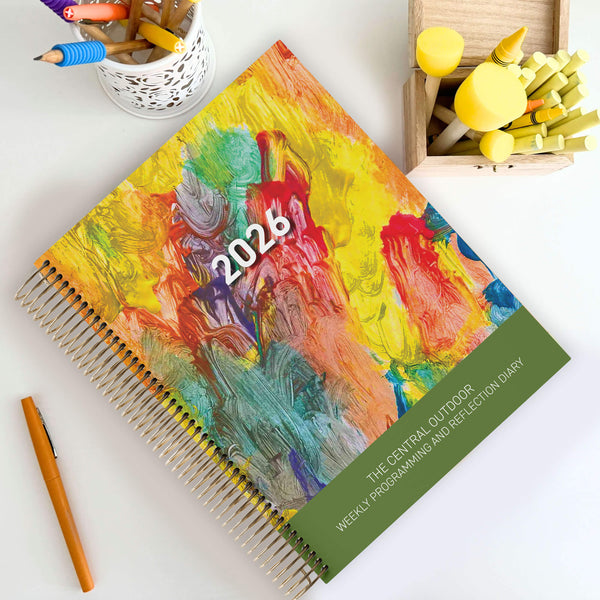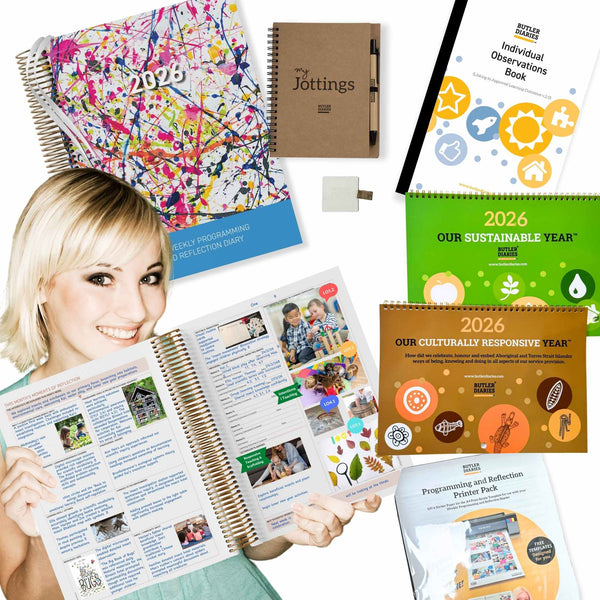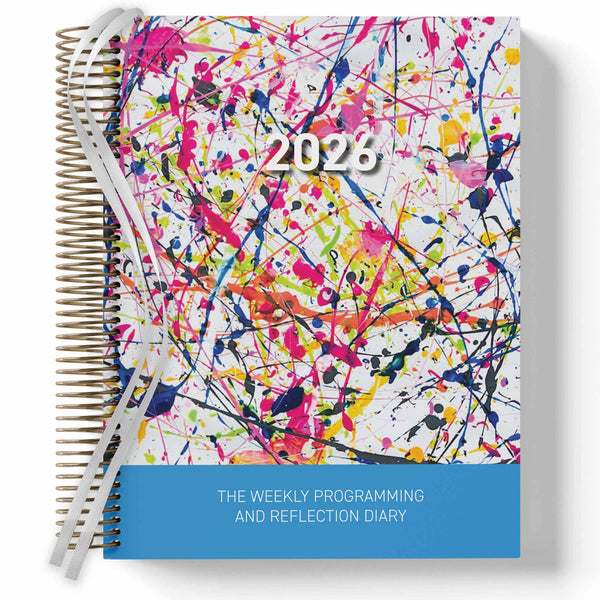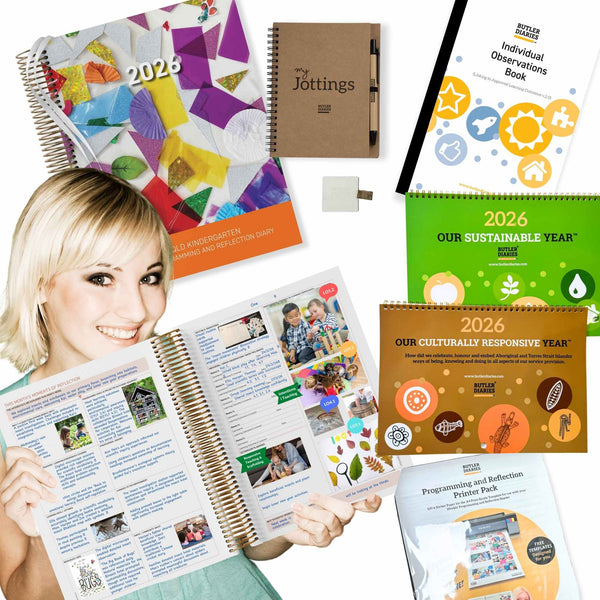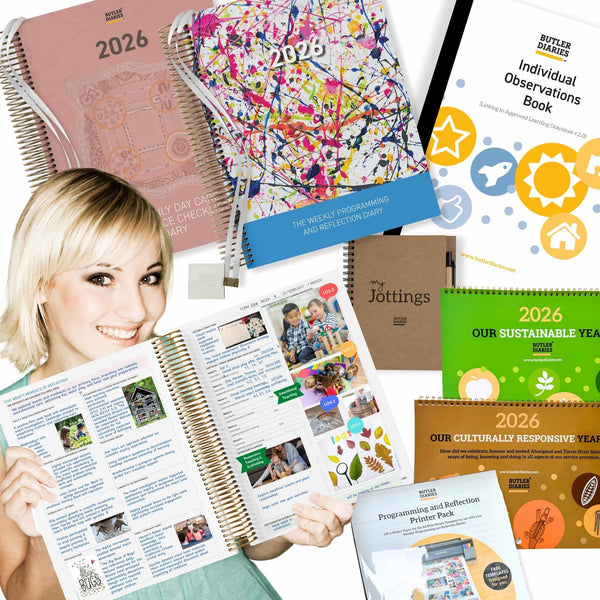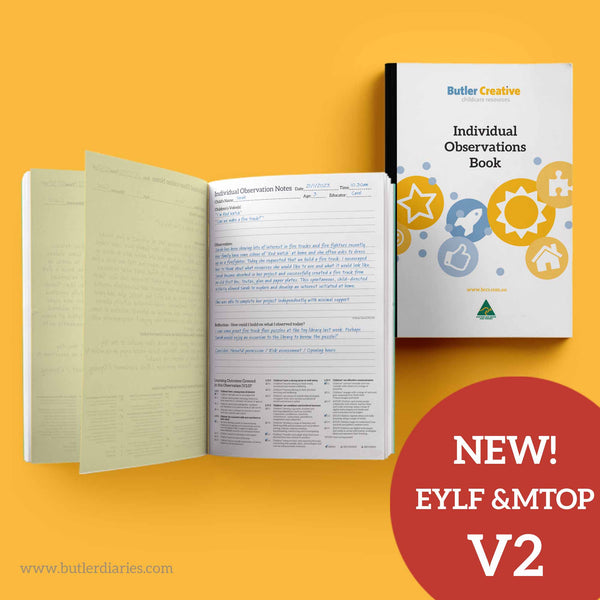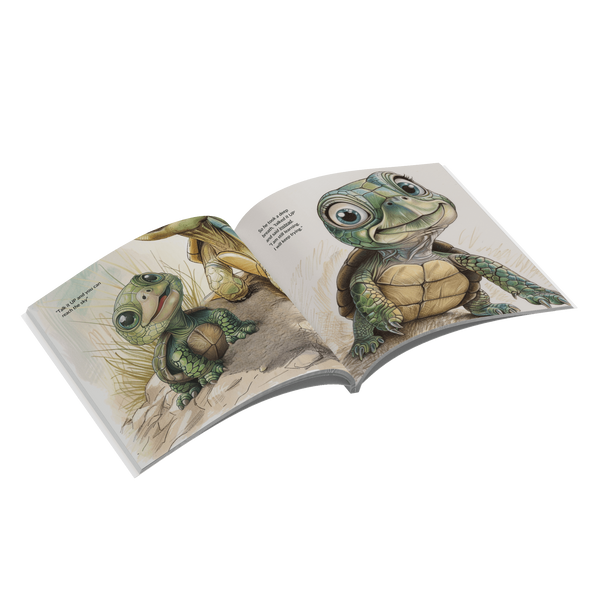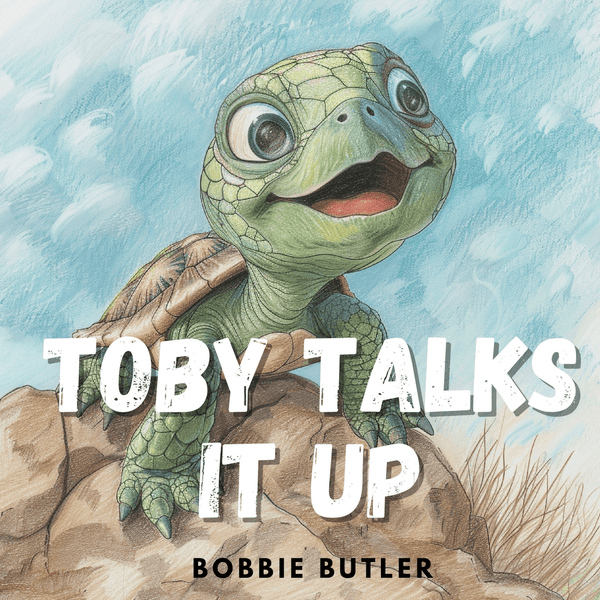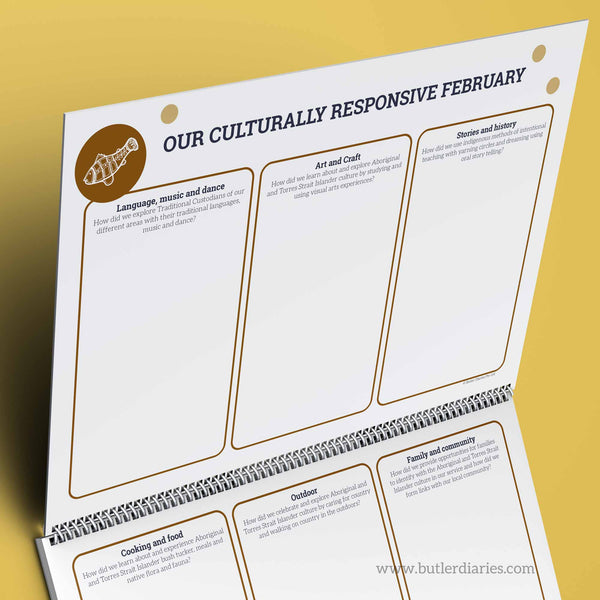"I am with babies and I am finding it hard to have the time to fill in the diary and when I do, I have missed a week or two. I have babies just starting, needing comfort and settling as well as my other bubs that need attention. I am finding it a lot of work. If you can help me with giving me pointers in how and when to use it, I would be grateful. I have no quiet time during each day as our bubs, all have different needs all day. Thankyou in advance if you can help me💚💛🙏✨️"
Does the Weekly Programming and Reflection Diary work for younger rooms?
Yes! The Weekly Programming and Reflection Diaries are designed to capture programs from babies through to school aged children. Slightly adapting the way you approach programming is what will help you complete your program.
We highly recommend the Weekly Programming and Reflection Diary Guide to fully support you in understanding how the Diary supports you in programming for babies and young children.
"I felt like the diary wasn’t fit for the baby room due to how I had been asked to use it. But after this course I feel confident to explain how it needs to work to best support my babies and staff."
We answered the above question below to support you to implement the Butler Method for younger age groups.
"I am finding it hard to have time to fill in the Diary" - It doesn't need to be full!
The Weekly Programming and Reflection Diaries are not designed to be completely filled all the time. It is likely older age groups such as Pre-school and School Aged Children may cover more experiences in a day leading to more spaces completed by the end of the week.
However, younger age groups such as babies are unlikely to complete so many experiences every day or even every week. The needs of the children in these age groups are completely different and the program should be adjusted.
It is perfectly okay to have empty spaces in your program or the same activity revisited more regularly - this is how children learn, especially younger babies!
At this age too, your experiences will be heavily focused on fostering a sense of belonging, strong attachments and relationships which is certainly appropriate and should be included in your program.
"I have babies just starting, needing comfort and settling as well as my other bubs that need attention" - That's okay, this is a part of your program!
This can be taken straight back to Attachment Theory that emphasises how important this comfort and settling is for children to learn and thrive. Face to face time, singing, talking, cuddling and all other behaviours to create a sense of belonging and strong relationships are all experiences you program for babies.
If you are spending more time trying to respect the babies new routine, more cuddles to settle them, or lots of time singing and talking, program it! This is a developmentally appropriate, child-centred program - forcing painting, cooking, etc. would not be appropriate if the babies are not ready for or enjoying these experiences. It may also not be realistic to offer these experiences every day.

"I am finding it a lot of work. If you can help me with giving me pointers in how and when to use it, I would be grateful. I have no quiet time during each day as our bubs, all have different needs all day" - Tips on using the Weekly Programming and Reflection Diary
The idea of the Weekly Programming and Reflection Diaries are to show a cycle of planning. This doesn't mean you need to pre-fill the whole program, just pre-fill some experiences to show how you are extending on the previous week's program and reflection. You can show how you are extending by including the child's name and the original experience date.
These are helpful blogs to help guide you on using your Weekly Programming and Reflection Diaries:
We also recommend the Weekly Programming and Reflection Diary Guide and Cycle of Planning Professional Development Training.
"I felt like the diary wasn’t fit for the baby room due to how I had been asked to use it. But after this course I feel confident to explain how it needs to work to best support my babies and staff."

Our Programming Diaries are designed to be completed in as little as 10 minutes per day. All Educators in the room can spend a few minutes each day completing the reflection spread and adding experiences that occur to the program - keeping in mind every space does not need to be completed each day. By the end of the week, your program and reflection will be complete and you can add one or more extension experiences for the following week.
The practices you use to meet each child's individual needs can also be added to the program and is considered a part of your program and very relevant to EYLF.
For more answers to frequently asked questions, check out this article.
Examples of Areas to Focus on
During the first year of life, children undergo rapid growth and development. Their brains are highly plastic, meaning they are exceptionally receptive to new experiences. Key areas of development include:
- Cognitive Development: Babies are learning to process information from their environment. Activities that stimulate their senses, such as looking at colourful objects, listening to soothing sounds, and exploring different textures, support cognitive growth.
- Physical Development: Infants develop motor skills through activities that encourage movement. Tummy time, reaching for toys, and gentle exercises help build strength and coordination.
- Emotional Development: Building secure attachments with caregivers is vital. Responsive caregiving, where the baby's needs are promptly and consistently met, fosters a sense of security and trust.
- Social Development: Interactions with caregivers and peers lay the groundwork for social skills. Simple games like peek-a-boo and face-to-face play encourage social engagement.
Therefore, setting up mats or spaces with different sensory toys to encourage tummy time and reaching is fostering their cognitive and physical development. You responding to their needs, chatting, singing and playing games are building emotional and social development.
As you may find your day is very routine heavy, times such as nappy change time, meal times, transitions and outdoor play are perfect opportunities to engage in programmed experiences as mentioned above.
Examples Program Spreads
The below example shows some pre-planned experiences as shown by the child's name with a date next to it. There would have been some kind of goal or previous experience and with my reflection spread as a tool, I would have pre-planned these experiences to build these skills and interest.
The rest of the program would have been completed as the week went on and I've chosen to code the learning outcomes by highlighting the experience.
As you can see, every box does not have something written in it but this would still be considered a complete program as it shows the cycle of planning and includes experiences as they emerged during the week.

In the next example, you can see I have incorporated many experiences into the routines. For example, due to a busy routine, our singing is done during nappy change times rather than during group times. Our role play box shows how we are going to set up our play mats which are perfect for group and individual play and we continue this for the entire week due to continued interest. Our group time just involves spending time singing what we are doing as we play together, transition or eat.
Again every box does not have something written in it but this would still be considered a complete program as it shows the cycle of planning and includes experiences as they emerged during the week. It focuses on children's goals, strengths and interests.
This time I have coded the experiences to learning outcomes with a tick.
I've noted areas to extend on in my last column based on observations I've made throughout the week.

The next week's program has pre-planned experiences as per my observations last week (you can see this by my FUP note) and I've added experiences as they have emerged. We continued the play mat of last week but made a change mid-week due to the age of babies near the end of the week. We've continued utilising routines for singing and talking.

My reflection spread would show why the mat continued, for example, high interest from the children and successfully encouraging children to foster physical skills. It would also show why the mat experience changed mid-week, for example, more younger babies on Thursday and Fridays who can't pick up the balls or don't show as much interest in non-musical toys yet.
By critically reflecting on your program, pre-planning some extensions and completing the rest of the program as it emerges from the children's interests, you have completed a full cycle. It also means you've spent less than ten minutes per day adding one or two experiences as they emerged and noting down a few reflection sentences to extend on the following week.









